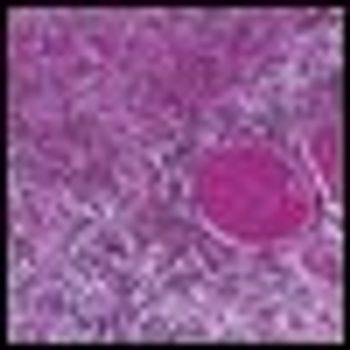
Thanks to the widespread use of highly active antiretroviral therapy (HAART), AIDS patients continue to live longer after their initial diagnosis.

Your AI-Trained Oncology Knowledge Connection!


Thanks to the widespread use of highly active antiretroviral therapy (HAART), AIDS patients continue to live longer after their initial diagnosis.

Despite recommendations against using EGFR inhibitors in the presence of KRAS mutations, cetuximab therapy may be enhanced by the presence of the p.G13D KRAS mutation.

Like the protective plastic cap at the ends of shoelaces that prevent them from unraveling, telomeres protect the ends of chromosomes. These small strips of DNA prevent chromosome tips from fraying during cell division. But as the cells divide, the telomeres shorten and the cells age. Shortened telomeres have been linked to an increased risk of cancer development. Researchers at the Mayo Clinic in Rochester, Minn., wanted to see if telomere shortening was linked to colon cancer development at a younger age.

After resection for cancer or peptic ulcer disease, the mucosa of the gastric stump is considered prone to the development of gastric cancer precursor lesions (see Fact box), most likely because of exposure to Helicobacter pylori infection. Italian researchers set out to determine if the risk of gastric cancer recurrence was greater in the stump in the presence of HP infection.

Novartis and its partner Antisoma announced that an interim analysis of data from a late-stage trial showed that vadimezam (ASA404) was unlikely to provide any benefit as a second-line treatment for patients with non-small-cell lung cancer. As a result, Novartis indicated that it would halt development of the compound, which was designed to inhibit angiogenesis.

NEW YORK-Turkey tail, healing touch, and liquidambar stryraciflua are areas in complementary medicine that are worth keeping an eye on, according to integrative oncology experts. The Society for Integrative Oncology (SIO) named five abstracts as its best during its 2010 meeting.

Ten-year follow-up results from the BCIRG 001 trial make a case for TAC therapy over FAC. In another study, researchers suggested a link between aromatase inhibitor therapy and breast density.

Jose Baselga, MD, PhD, and Michael Untch, MD, shared results from the NeoALLTO and GeparQuinto trials, respectively. NeoALLTO is a phase III, randomized, open-label, neoadjuvant study of lapatinib (Tykerb), trastuzumab (Herceptin), and their combination plus paclitaxel in women with HER2-positive primary breast cancer. GeparQuinto (GBG 44) is evaluating lapatinib vs trastuzumab in combination with neoadjuvant anthracycline- and taxane-based chemotherapy.

Researchers from the ATAC and BIG 1-98 trials reported that CYP2D6 testing is not ready for prime time for gauging response to tamoxifen. While of the leading researchers in the field of CYP2D6 genotyping posed some key questions that need to be answered before CYP2D6 can be officially ruled out, or embraced, in clinical practice, these study results strongly suggest that CYPD2D6 testing should not be part of the standard of care, said Claudine Isaacs, MD.

Results from the GINECO group study demonstrate Afinitor’s ability to buy more time for patients while Xgeva makes everyday life less painful.

Exemestane provides a new option for upfront, five-year endocrine therapy in postmenopausal women, based on results of the first definitive early breast cancer trial to compare nonsteroidal and steroidal therapy.

An analysis of multiple ECOG trials found that obese women with hormone receptor-positive breast cancer experience worse outcomes. But an exploratory analysis of the international TEAM trial indicated that obesity does not exert a negative influence on the efficacy of adjuvant endocrine therapy.

Experimental drugs from ImmunoGen, Seattle Genetics, and S*BIO advance therapeutic options in multiple myeloma, anaplastic large-cell lymphoma, and relapsed lymphoma.

Nplate sustains platelet counts in patients with adult chronic immune (idiopathic) thrombocytopenic purpura (ITP) while single-dose Zevalin offers survival advantage in non-Hodgkin’s lymphoma.

Patients with incurable NSCLC are less likely to progress to second-linetherapy with the right maintenance regimen. But maintenance therapyalso means committing patients to continuous treatment without anybreaks or chances to recover from adverse events.

CAL-101 and GA101 demonstrate active results in indolent B-cell non-Hodgkin’s lymphoma and chronic lymphocytic leukemia while a secondary analysis of a pralatrexate (Folotyn) trial shows a benefit for peripheral T-cell lymphoma patients who fail second-line therapy.

ASCO recently released updated guidelines on the use of adjuvant endocrine therapy in hormone-receptor-positive breast cancer. While the guidelines focus on all postmenopausal women, those who are age 75 and older require special consideration. Unfortunately, meaningful data to help healthcare providers make treatment decisions for these patients are scarce, according to Peter Ravdin, MD, PhD, an executive committee member and scientific program planning member of SABCS 2010.

The threshold for physicians to accept worthiness of chemoprevention with 5-α reductase inhibitors remains high.

Esophagitis is a known adverse effect of bisphosphonate use and reflux esophagitis is an established risk factor for esophageal cancer through the Barrett pathway.

Radiation oncologist Jonathan J. Beitler, MD, MBA, offers the radiation oncology perspective on the array of treatment combinations in this complex disease.

Investigators at Memorial-Sloan Kettering plan to tease out exactly how much vitamin D is enough to improve survival prospects.

Patients saw improvements in progression-free survival, while oncologists saw benefit of evidence-driven medicine at work.

Whether elderly patients receive adjuvant therapy depends on their health status and how well the physician communicates the risks and benefits.

The Society of Gynecologic Oncologists conducted a demographic and practice survey and found that their members are shifting away from private practice into salaried positions. The survey also found an increase in the number of group or multispecialty practices.

Citing different studies, two physicians reach different conclusions as to whether ovarian cancer screening is worthwhile.

Postmastectomy radiation therapy increased five-year overall survival by almost 50% and reduced recurrence risk by nearly 30%, according to a study in the International Journal of Radiation Oncology, Biology, Physics.

Ipilimumab has being lauded as a monumental advance in the field of immuno-oncology. While the news is certainly promising, unanswered questions remain and the melanoma community must proceed with caution.

On the heels of a lawsuit filed by multiple medical associations, the Federal Trade Commission has delayed enforcement of the Red Flags Rule through December 31, 2010, while lawmakers consider legislation that would affect the scope of entities covered by the rule.

Healthcare professionals must do more to address an issue that impacts a patient’s daily life.

Metabolic inhibition by chemotherapeutic drugs most likely hampers imaging results.

Published: March 2nd 2008 | Updated:

Published: April 1st 2008 | Updated:

Published: April 1st 2008 | Updated:

Published: April 1st 2008 | Updated:

Published: May 2nd 2008 | Updated:

Published: May 2nd 2008 | Updated: